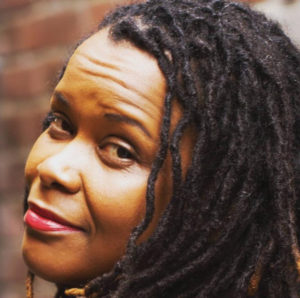Faith in Oneself: Towards a Black Humanist Buddhism

One of the most distinguishing traits of Black American culture is our near-universal experience of being a “churched” people. Nearly eighty percent of us identify as Christians, and two percent of our total population are practicing Muslims. This means the average Black American spent a significant portion of their childhood in a house of worship. As adults—though our church attendance might be spotty—our belief in an omnipotent god who has the power to save us remains steady.
So, what to make of Carla Kelly? The 42 year-old teacher and artist grew up in a household where both parents had eschewed their Christian upbringing and subscribed to a humanist ideology before she was even born.
“I was keenly aware that my family and I were different from most Black people,” Kelly says.
Instead of Sunday School and Bible study, Kelly attended meetings at the Soka Gakkai International (SGI) community center in New York City. A Buddhist organization that encourages its members to do the human revolution necessary to overcome suffering and achieve absolute happiness, Kelly had little in common with friends whose solution to problems was to “give it to God.”
As Kelly became a young adult, this difference in how she navigated life would be highlighted often. SGI members believe themselves to be the protagonists of their own lives. The notion that anyone but herself would intercede on her behalf when encountering obstacles was foreign to Kelly. As a result, she found herself bewildered when friends and extended family members leaned on this belief system.
“I trust the choices I make to create fortune to facilitate whatever goals I am trying to reach,” Kelly asserts. “I find my monotheistic friends leave things in the hands of something/someone ‘beyond’ them, and tend to disengage in moments when they could push harder to source the solutions they need.”
“Only one percent of Black folks in the U.S. consider themselves atheists or agnostics.”
When I found my way to the SGI community, I was one of those backsliding Christians who’d come to believe in the principles of humanism without having a concrete language for it. Unlike Kelly, I hadn’t spent my formative years in a spiritual community where there was no talk of God or salvation through Christ. Instead, she had only reminders of how powerful humans were if we cultivated the courage to fight through our own darkness to become happy and support our fellow Earthmates in doing the same.
For the past thirteen years, I’ve found myself fascinated by SGI members like Kelly. What must it have been like to grow up with such an unshakeable faith in yourself? To truly believe that human beings could ultimately save themselves—even though many of us shied away from that ability—to believe we were capable of it on our own? What must it be like to have only known a spiritual practice with that amount of faith in humanity?
Only one percent of Black folks in the United States consider themselves atheists or agnostics. Less than one percent of us have found our way to Buddhism as a spiritual practice. I imagine that within that tiny percentage are a large number of former Christians whose memories of church are mired in lessons of fear, guilt, and shame. While we valued the soul-stirring music and the community created within church, we found the message of human unworthiness and the edict to seek salvation through subjugation left us with more trauma than it instilled peace.
Kelly doesn’t believe her churchgoing friends are any better or worse at being compassionate human beings than she is. Much of the trauma she hears former Christians, like me, unpacking is about how religion has been used to reinforce structures that support white supremacy and capitalism. “The Church of The Americas has instilled shame, guilt, fear, trauma, avoidance, and all manner of other things into Black folks in the diaspora,” she says. In other words, one doesn’t have to be a practicing theist to find themselves victim of the very thinking that drives believers to a religious institution that capitalizes off those feelings in the first place.
The greatest gift the SGI community has given me is a tool to work through my own religious trauma. Early on my path as an agnostic, I obsessed a great deal over the validity of church doctrine, whether or not its judgmental (and sometimes abusive) god existed. Engaging in dialogues with women like Kelly has helped me develop a much more humanistic belief system that goes far beyond an easy rejection of the churchiness of the Black community.
Recently, a friend’s daughter interviewed me for a school project. She had to talk to someone who didn’t practice the same religion as she did. During our conversation, she struggled to understand a spiritual practice that didn’t have belief in a deity as its core. This inquisitive fifteen year-old pushed for a direct answer: “So, do you believe in God or not?”
I could only respond, “That question hasn’t mattered to me in a very long time. So, I don’t really have an answer for you. All I can say is my loyalties lie with human beings, not supernatural ones.”
We all have our own stories of how we came to be humanists, and we want to hear yours! Fill out the form here to be featured in this series. You can also share your journey and chat with others on the Journeys to Humanism channel on the AHA’s Discord Server.
